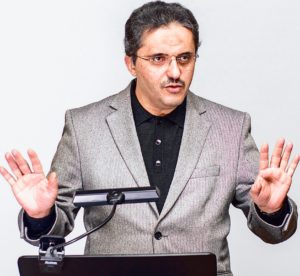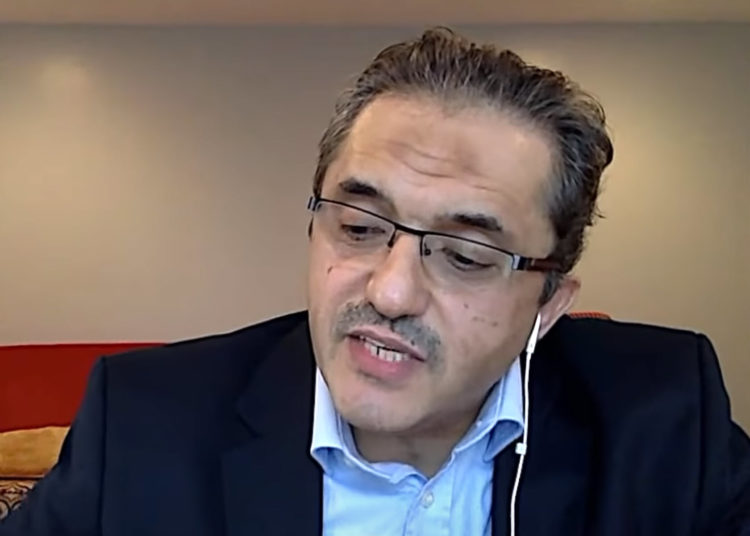Abdullah Bozkurt/Stockholm
The US State Department has said the US government is not convinced about Turkey’s accusations against a journalist who has been critical of the regime of President Recep Tayyip Erdoğan and asked Turkish authorities to provide concrete evidence for the extradition request.
According to an internal government communiqué obtained by Nordic Monitor, the Turkish Justice Ministry sent an urgent note to the Ankara Chief Public Prosecutor’s Office saying that the extradition request filed with US authorities for Ahmet Kurucan, a 60-year-old author and journalist, lacked concrete evidence.
The communiqué, signed by Emrah Özkan of the General Directorate of Foreign Relations in the Turkish Justice Ministry on October 5, 2021, indicated that the US State Department requested additional information on the substance of the crimes allegedly committed by Kurucan as well as solid evidence. Özkan told the Ankara Chief Public Prosecutor’s Office to come up with what he described as a “case file review report” about Kurucan, listing the alleged crimes that Kurucan was personally involved in and concrete evidence that links the journalist to these alleged crimes.
He said the US government’s response must be shared with the Ankara 4th High Criminal Court, which issued an arrest warrant for Kurucan on January 30, 2017, and that a new summary report must be prepared by October 29 at the latest. He also urged the prosecutor’s office to include additional evidence collected against the journalist since the first extradition request was filed with the US provided that such evidence would facilitate the extradition procedure.
The communiqué lays bare how the Erdoğan government abused the intergovernmental mechanismwith the US to file frivolous extradition requests that lacked solid evidence.
Turkey has gained notoriety under the oppressive President Erdoğan when it comes to abusing the criminal justice system and manipulating criminal procedures to muzzle critical voices, stifle dissent and intimidate the opposition. Turkish authorities are quick to brand opponents of the current regime as terrorists, and partisan prosecutors have been known to fabricate evidence to build bogus cases against unsuspecting people who have nothing to do with terrorism or crime.
Turkish government’s internal communiqué mentions the US State Department’s note sent to Turkey regarding the extradition of a US-based Turkish journalist:
The Erdoğan government brands all its critics as terrorists, and 174 journalists are currently locked up in Turkish jails on terrorism charges, making Turkey one of the world’s leading jailers of journalists, according to the latest monitoring report by the Stockholm Center for Freedom, which also listed 167 Turkish journalists in total as living in exile to escape imprisonment on false accusations.
According to the arrest warrant, Kurucan was charged with multiple crimes ranging from terrorism to coup plotting to political and military espionage. He faces life in prison should he return to Turkey.
Kurucan, who has been living in the US for more than 20 years, wrote opinion pieces critical of the Erdoğan government for Zaman, at one time Turkey’s most highly circulated newspaper. Zaman, which used to sell 1.2 million copies a day at its peak, was seized by the government in March 2016 as the government wanted to silence the mainstream daily, which was exposing corruption in the Erdoğan government and revealing clandestine intelligence operations that aided and abetted armed jihadist groups. It was closed by the government four months later.
The journalist continues to write op-eds for the Turkish news website Tr724 that operates out of Belgium. He has also been involved in a number of interfaith dialogue and cultural organizations in the US.

Kurucan, who has a Ph.D. in Islamic law, made a name for himself as an expert on Islamic jurisprudence and often clashed with Turkish political Islamists on a number of issues. He is affiliated with Fethullah Gülen, a US resident and arch foe of President Erdoğan. The Turkish government’s extradition requests for Gülen since 2015 have also failed in the US, where authorities concluded that the case file submitted by Turkey lacked solid evidence linking Gülen to any crime.
His book on freedom of thought in Islam in which he offered some seminal ideas irritated Turkish political Islamists. He has been harshly critical of terrorist attacks perpetrated by Muslims in the name of religion and made clear that he can see no evidence or justification in the Quran, the hadiths or other Islamic sources for such terrorist attacks.
He came up against the murder fatwa on Salman Rushdie and criticized the Iranian mullah, saying that calling apostasy a crime is a complete violation of human rights and that forbidding someone from changing their religion is against the Islamic principle that people cannot be forced to practice religion. “Religion is a matter of free choice. People should be able to make their own decisions on this matter. Islam does not endorse coercion in choosing a religion,” he said in an interview published in 2015 in the aftermath of the Paris terrorist attacks.
According to Kurucan, capital punishment for apostasy would contradict the principles of Islam. It would contradict the verse that lets people believe in or reject their faith. In addition, Kurucan says that in the statements of the Prophet (hadiths) there is no remark supporting punishment for apostasy. On the contrary, during the lifetime of the Prophet Muhammad, Uthman bin Abdullah first converted to Islam in Medina but later told the Prophet that he had left Islam. Uthman bin Abdullah was able to go back to Mecca and lived there until the end of his life.
As a result, any punishment that might have been meted out by Muslims cannot be justified by Islam as it is not a religious but a political matter.
Turkey’s extradition request for Kurucan is not expected to succeed. Yet it represents a form of harassment by the Erdoğan government against journalists, academics and human rights activists who live abroad.












